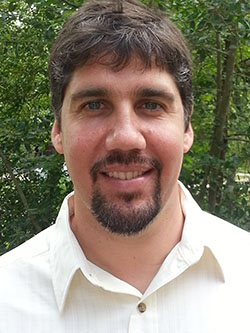“Communication is foundational to the human experience,” says Capitol electrical engineering graduate Steven Noonan, who has spent a good part his career designing, implementing, and managing systems that help people communicate. “Whenever I feel I’m getting lost in the bits and bytes, I think about how the technology is being used: what needs to be accomplished, and what I’m really enabling people to do.”
Today we communicate in a variety of ways that people of a prior era might have deemed magical: like taking a snapshot at the park and instantly uploading it to social media or video calling over the web and across long distances. Not only do these applications have a tremendous “wow” factor, but they also help with very human concerns, he points out.
“It can be anything from solidifying a business deal in a teleconference to connecting with a loved one at an important time in their life. These are the kinds of things we’re enabling in the telecommunications profession and they are happening constantly, 24x7x365” says Noonan, who is currently a Voice Engineer at Education Networks of America. “I try to remind myself of that fact pretty regularly… I’ll think ‘here is a good and valuable technology that is serving so many people, helping them accomplish all these wonderful things’.”
“It keeps me grounded in terms of why I’m in this line of work and how mankind benefits from it.”
Noonan came to the field relatively late. He had originally gone to college to study accounting, but decided it wasn’t for him. After stints working for Amtrak and in the alarm system business, he decided to resume his education. Capitol College – as today’s university was then known – was the school he chose.
“I didn’t like the big schools where you’d have to literally “run” 15 minutes across campus to get to class on time, and then sit in a room with 450 people.” Professors at Prince George’s County Community College, where he completed an associate’s degree in Electronics Engineering Technology, recommended Capitol, and he decided to check it out. He liked what he found there: small classroom sizes, the ability to have meaningful interactions with faculty and fellow students, and an overall environment that provided technical hands on learning and collaboration.
He graduated in 2000. A new millennium had just dawned and telecommunications was booming. Job opportunities were available everywhere he looked. That was important to Noonan, who wanted to make sure his degree would translate into a solid career. The Career Services department at Capitol helped him get started with an internship and he went on to hold a variety of positions in both the government and private sectors.
A decade and a half later, his work still excites him – not least because of the breathtaking pace of change. Telecommunications today is so different, compared to when he started out, that even the prefix “tele” sometimes feels quite inadequate.
“It’s software-centric now,” Noonan explains. “When I entered the field, voice technology was mostly SS7 and over TDM digital circuits, whereas now - whether data, voice, or video - we use communication applications that run over an all IP (mobile and/or terrestrial) network. The newfangled stuff is going over the internet and both the media and the modes of communication are changing. We’re seeing now and will increasingly experience a really immersive, collaborative, and multimedia-oriented kind of telecommunications that is software and cloud based and is enabling layered communications capabilities that just didn’t exist before.”
So what advice does this seasoned professional have for students who are as fired up as he was about the ways technology can enhance the way we communicate? What should they focus on to get a running start in the field?
“Spend some initial time learning the foundations and history of telecommunications, but just enough to get the basics of how systems are engineered to reliably and quickly convey information from point A to point B. With this understanding, specialize in one or more of the communications technologies which are in demand now and into the future” Noonan says. “Think VoIP for business. Think WebRTC. Think mobile and global communications systems and Apps. Then, learn and exercise the programming languages and protocols used to bring these new communications modes and capabilities to life.”
“Most importantly think about your end-user and how they need and want to share information. By doing so, you’ll be able to provide fit-for-purpose communication services that deliver real value and benefit to your customers. Going forward these are the skills you want.”



